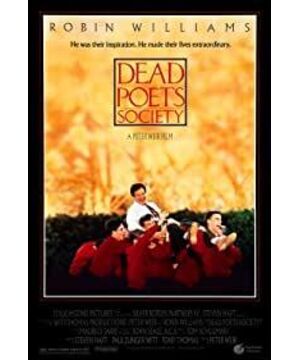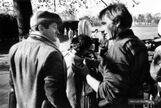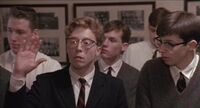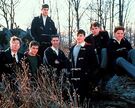The second time I saw it, I broke the previous prejudice and no longer thought that Teacher Keating was a complete coward. It is really ideal and reality, and the relationship between poetry and the cultivation of modern elites is too shallow. If you want to blame, you have to shift your excuse to the head of the times.
Between the two destinies of "Poet-Joker" and "Elite-Doll", what would you choose?
Keating is really a different kind. It's even a bit contradictory. He has a very elite experience, such as graduating from Cambridge, but he is cynical. From the section where he saw the old photos, it may be speculated that the death poetry club he participated in before may have experienced a similar tragedy: a group of adolescent boys spontaneously resisted the school’s old-fashioned education and organized a secret base to read poetry. , Presumptuous... In the end, maybe there was a conflict with the school. Some members paid a price for it. From then on, most people buried the poetry society deeply and lived in an orderly manner. However, it is impossible to completely forget the beauty of the year.
Regarding why he came back, Keating himself answered with an official voice: because I love education. But even the students couldn't help but wonder why he came back. His character style is too incompatible with this college with a glorious history. The reason why Keating returned to his alma mater was to challenge authority with enough self-confidence to continue the unfinished dream of being a poet. He may think that now that the stars are moving, maybe the dream may come true.
As a result, the story of the year repeats itself. With fresh blood, this poet's dream has reached its climax. Charlie dared to mock the principal with a call from God in front of the whole school. The students' understanding is always simple. Think that the poet is the poet, the elite is the elite, duality opposition. But Keating tells Charlie that you are stupid, and if you are expelled, you will lose many precious opportunities.
Full of eclectic tone. Between dream and reality, he tried to find a balance. Perhaps what he is looking forward to is not a revolution, but a reform movement. This may be the result of his reflection on the rebellious generation.
On the curtain of history, the same repertoire is staged, but the actors have changed. The ending has changed.
When I counted 930 shots, I could no longer hold on to myself. Keating came back to the classroom to pick up things, go in and out, in the solemn classroom, like a clown, about to leave the scene sadly. At this moment, Todd jumped on the table and called out "Captain, oh my captain". The audience burst into tears. The roles of the clown and the leader suddenly changed. The authoritative old principal was at a loss, and the dreamy scene spread before Keating's eyes.
All efforts were not wasted. The Death Poetry Club of that year found the follow-up incense. And this generation is more powerful.
At least, those young people who stood on the table far surpassed their peers who were buried in their heads and dared not get up. Although the story did not give a transcendent third answer, which perfectly resolved the conflict between the poet and the elite, it finally gave a position of sufficient strength. There is hope.
Already full, already full.
View more about Dead Poets Society reviews






